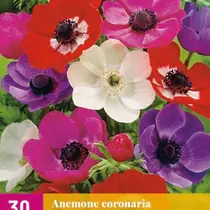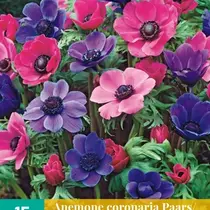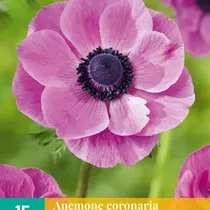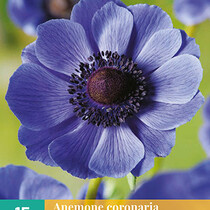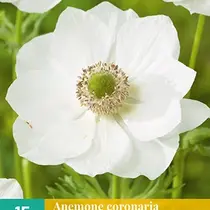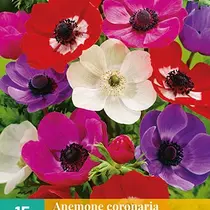Anemones come in several varieties and are great for naturalising!
Anemones are very well-known in the Netherlands, these come in different varieties. You can easily propagate them in the garden.
Read moreThese pretty pink/purple anemones are easy garden flowers, they come in several varieties and are excellent for naturalising.
Read moreThis new variety in the anemone family is easy to plant in pots / containers, but also definitely among the other spring bloomers in the garden.
Read moreWe supply anemone in various colours and varieties in small and large packs. Order easily online and enjoy beautiful flowers in summer.
Read more- Delivery costs depending on the country
- Snelle Levering (per product vermeld)
- Gratis bezorging vanaf 60 euro
Anemone 'Mr. Fokker' (Anemone coronaria) surprises you with single flowers in a beautiful blue colour. This anemone variety is a trouble-free garden resident that flowers easily.
Read moreThe anemone coronaria bride flowers profusely and long. The anemone is extremely suitable for naturalising and blooms from May to July.
Read moreSuperb anemone coronaria de cean, a colourful display of flowers, these are perfect for naturalising. - Competitive prices
Read morePlanting anemone bulbs - instructions
Anemone specification
Height: 15cm
Spacing: 15cm
Planting time: June - July
Flowering period: March - April
Well-drained, slightly acid soil
Plant anemone bulbs in a place where the soil is well-drained. If there are still puddles 5-6 hours after heavy rain, try to find another spot. Alternatively, you can add organic material to the soil to improve it and make it more draining. Peat moss, compost or composted manure are well suited for this purpose and available everywhere. Slightly acidic soil enriched with compost is ideal for anemones.
Where should I plant my Anemone bulbs?
Plant your anemone bulbs in a spot where they will receive as much sun as possible.
Anemone care instructions
Soak anemone bulbs prior to planting
When planting anemone bulbs, remember to soak the bulbs in lukewarm water for a few hours prior to planting. You do this to give them new life. Next, make holes in the soil where you want to plant the anemone bulbs and plant the bulbs about 2.5 to 5 cm deep. It does not matter how the bulbs are planted, because when they emerge they naturally have the ability to find their way up.
Keep watering during autumn, wait until spring
After planting anemone bulbs, water the bulbs well, soaking the soil thoroughly. Roots will form in autumn, soon followed by foliage. Flowers appear in spring.
Anemone as a cut flower for bouquets
When the anemone is in flower, you can cut off the flower to incorporate into a bouquet if you wish. This will not harm the plant. Water your anemones regularly during the first growing season so that they can establish a deep, extensive root system.
Leave foliage alone until the end of summer
When the flowering period is over for the season, leave the foliage alone and don't cut it off. The remaining leaves catch sunlight and provide nutrition for the following year. Water if necessary.
Anemone leaves turn yellow and die as the end of summer approaches, then the anemone sinks into dormancy. At that point, the remaining foliage can be removed. Anemones are dormant during the autumn and winter months until the next growth cycle begins.
Our anemone bulbs and other products come with detailed planting instructions.


